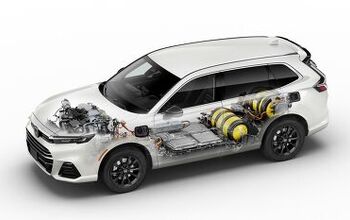General Motors Death Watch 201: Carmegeddon Pt. 1
When a company doesn’t have enough money to pay creditors what they’re owed, it’s considered insolvent. By this definition, GM is insolvent. The American automaker’s working capital stands at negative $20b. Cash outflow for the half year through June 30 remains negative, at over seven billion dollars. And it’s getting worse, as cash calls arrive on a regular– and irregular– basis. There’s no more credit to tap, and GM has few assets of meaningful value left to sell. Oh yeah, GM’s gonna file for bankruptcy. Then what?
The timing of GM’s C11 depends on its management’s psychology. At some point, somewhere around the $10b-in-the-bank mark, CEO Rick Wagoner, COO Fritz Henderson and CFO Ray Young will realize that they can no longer maintain “plausible deniability.” In other words, GM’s managers’ fiduciary responsibilities will compel them to enter bankruptcy protection with some cash rather than none– lest they lose control of their company in the reorganization to follow.
GM will file for bankruptcy late in the day, early or in the middle of month, right before the automaker has to pay its suppliers. The filing will be just a few pages of legalese– nothing grandiose. Only the news media, Washington DC and the general public will react with shock. Wall Street will not be surprised; the stock market won’t crater. By the time the company cries uncle, only true believers will own GM stock. Within hours of the filing, GM will be de-listed from the NYSE. Dow Jones will remove GM from the DJ Industrial Index.
True to their nature, GM’s execs will accept no responsibility for the company’s catastrophic failure. They will blame the economy, energy prices, government regulation, their own bankers, anything, everything, anyone and everyone but themselves. As before, their “victim of circumstance” sob story will convince many that it’s somehow a political failure, even as the men in charge admit defeat, unfurl their golden parachutes and prepare to surrender power they should have never held in the first place.
[In truth, Wagoner should have directed GM to file for bankruptcy in December 2005, when The General still had significant assets to sell. The automaker would be reorganized by now, with fewer dealers, brands and factories. And a clean balance sheet.]
Aside from an uninformed not-to-say oblivious public, the damage to Wagoner and his team’s personal reputations will be total. But the company’s C11 filing will not take down the whole GM Empire. C11 will be limited to the overall corporate entity and GM North America. Europe, Latin America and Asia will be spared the financial ignominy.
Initially, nothing much will change inside GM. The company brass will issue an internal memo to frightened workers promising a bright future. There will be no immediate layoffs or job losses; paychecks and benefits will remain in place. Later in the reorg process, a few key executives will receive “retention bonuses,” while many in the rank and file lose everything.
While the filing will not mention dealer termination, the smarter Buick, GMC, HUMMER, Pontiac, Saturn and Saab dealers (in whatever combination) will immediately understand that their days are numbered. They will either close-up shop or expand/satellite with one of their import brands. Those dealers who try to ride it out will experience a slow death for a year or so– until the reorganization plans outlines the end game for GM’s superfluous brands.
Bankruptcy will not sound the death knell for GM’s sales. Responding to commercials touting The General’s “Next 100 years,” patriotic buyers in the flyover states will flock to GM stores to do their part– especially when they see the mind-blowing bargains GM will use to clear inventory. The General’s public will not foresee the fact that only Chevrolet and Cadillac will survive. The initial sales rush of sales will convince many that the dead brands walking will live again. But they won’t.
GMAC will not be able to bankroll these fire sale purchases; it too will be subject to Court oversight (thank you Rescap). So instead of subvention paid to GMAC to move the metal, GM will use “outside” lenders to the same end. Smart bankers will experience a windfall– financing good credit customers at rates higher than justified (compensated by GM) to make consumer credit available at below market rates. Credit unions will scramble to partake in the new largess. Leases? Forget that.
The biggest casualties from a GM bankruptcy: Chrysler and Ford. Of course, Chrysler’s already toast. It’s only a matter of time before they go into liquidation. But Ford will face an epic internal struggle to avoid C11, and resulting loss of Ford family control. After the initial pall, when GM’s killer deals come on-stream, The General will steal food directly from FoMoCo’s table.
But once Ford files, and Chrysler goes into liquidation, the no-longer-Ford-family-controlled automaker will be able to clean its house and match GM’s deals. The biggest loser in all this? Toyota. We’ll discuss that in our next installment.
More by Ken Elias
Latest Car Reviews
Read moreLatest Product Reviews
Read moreRecent Comments
- Dale Had one. The only car I ever bought because of a review in a guitar magazine.Sure was roomy inside for such a small car. Super practical. Not much fun to drive even with a manual.Sent it to college with my stepson where it got sideswiped. Later he traded it in on an F-150.
- Bd2 Hyundai's designs are indeed among the most innovative and their battery technologies should allow class leading fuel consumption. Smartstream hybrids are extremely reliable.
- 28-Cars-Later So now H/K motors will last longer in between scheduled replacements. Wow, actual progress.
- AZFelix I have always wondered if the poor ability of Tesla cars in detecting children was due to their using camera only systems. Optical geometry explains that a child half the height of an adult seems to have the same height as that same adult standing twice as far away from the viewer.
- 28-Cars-Later Actually pretty appealing (apparently I'm doing this now). On a similar note, a friend of mine had a difficult situation with a tenant which led to eviction and apparently the tenant has abandoned a 2007 Jag S-Type with unknown miles in the garage so he called me for an opinion. Before checking I said $2-3 max, low and behold I'm just that good with the 3.0L clocking in at $2,3 on average (oddly the 4.2 V8 version only pulls $2,9ish) and S-Types after MY05 are supposedly decent.


































Comments
Join the conversation
menno: Exactly. Or perhaps even rebadged Asia-built models - just so long as it's from a "domestic" brand. Chevy Aveo, anyone? (There was a "Pluggers" strip years ago that had a character asking his wife, "Do we buy the American car made in Mexico, or the Japanese car made in America?") It seems clear a lot of people just aren't aware of how the car manufacturing business has changed over the past few decades - you'd think from the way some react that Toyota, Honda &c. had never built a single plant in North America. I'll freely admit that I'm a Honda fan - I love their dedication to R&D, the fact that every CEO has been an engineer, and so on. But if they ever did fall on their face the way GM has done, I'd look elsewhere. One of the main drivers of capitalism is consumers looking for the best product at the best price; that's what fuels innovation and prods companies to keep up and compete. It gets shocked reactions, but I really enjoy telling people who refuse to consider "foreign" cars that they're "anti-capitallist."
What's the big deal about buying from a bankrupt GM ? They didn't like to honor their warranties when they were solvent, so there should be no difference.